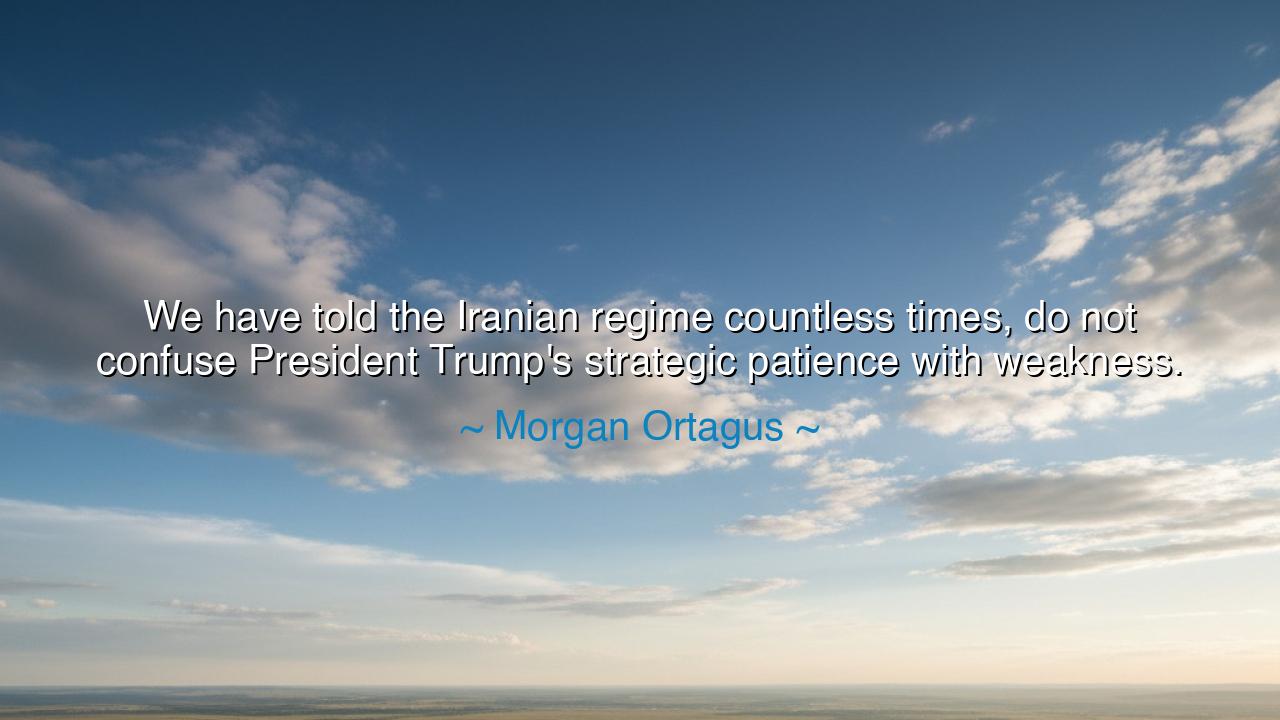
We have told the Iranian regime countless times, do not confuse
We have told the Iranian regime countless times, do not confuse President Trump's strategic patience with weakness.






Morgan Ortagus once spoke with the fire of a herald and the weight of a warning: “We have told the Iranian regime countless times, do not confuse President Trump’s strategic patience with weakness.” In these words lies a truth older than empires, a truth known to warriors, rulers, and sages across the ages. For the virtue of patience has always walked hand in hand with the perception of power, and it has always risked being mistaken for timidity. But patience, when strategic, is not cowardice; it is the gathering of strength, the coiling of the bowstring before the arrow is loosed.
In the chronicles of the ancients, many great leaders learned to wield patience as a weapon sharper than the sword. Consider the story of Hannibal, the Carthaginian general who crossed the Alps with elephants to strike fear into the heart of Rome. For years, he lingered, waiting, biding his time, striking where Rome was weakest, refusing to be drawn into traps. The Romans mistook his endurance for uncertainty, yet his restraint was deliberate. He knew that the fiercest strike comes not from haste, but from waiting until the enemy’s own strength falters. In this way, strategic patience proved itself a power greater than reckless charge.
Yet Ortagus’s words also reveal the danger: when patience is seen but not understood, it may be mistaken for weakness. History records how nations and rulers, misjudging the calm before the storm, invited their own ruin. In 1941, Japan struck Pearl Harbor under the false belief that America lacked the will to respond. The patience of a nation was misread as hesitation, but the result was thunderous retribution, reshaping the world. Thus we see: to mistake patience for frailty is to awaken a sleeping giant.
The wisdom here is not confined to nations and armies, but speaks also to the soul of each individual. In life, many will mistake your restraint for passivity, your silence for surrender. But those who are wise know that waiting is not idleness. Just as the seed lies beneath the soil through long winter nights, preparing to burst forth in spring, so too does the heart gather its strength in seasons of stillness. The weak rush; the strong wait for their moment.
Yet we must temper this with discernment. Strategic patience is not endless waiting, nor is it cowardly retreat. It is the art of readiness — the calm calculation that discerns when to hold and when to act. Alexander the Great, though famed for boldness, often restrained his armies for months until the terrain, the supply lines, and the will of his enemies aligned in his favor. His victories were not accidents of speed but the fruits of foresight.
From Ortagus’s warning, let us learn this: whether in politics, in battle, or in the trials of life, patience must never be confused with weakness. True patience is forged in discipline; it is strength under control. To act too soon is to squander opportunity; to act too late is to surrender it. But to wait with wisdom, and to strike with clarity, is to master the rhythm of power itself.
Therefore, let each listener take this path: in your conflicts, be not hasty to prove your strength with noise or anger. Hold steady, watch, prepare. Let your silence be purposeful, your restraint deliberate. When the moment comes, let your action be decisive, swift, and undeniable. For in this balance — the union of patience and strength — lies the ancient art of victory. And remember Ortagus’s words as a shield against doubt: that true strategic patience is never weakness, but the hidden strength of the wise.






AAdministratorAdministrator
Welcome, honored guests. Please leave a comment, we will respond soon